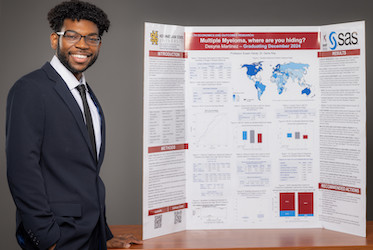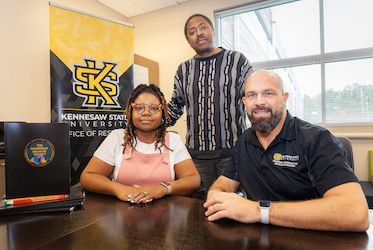
Kennesaw State professor awarded NSF grant to teach students detection of cybersecurity attacks
KENNESAW, Ga. | Oct 11, 2021

Kennesaw State University information technology professor Hossain Shahriar, along with colleagues Dan Lo and Michael Whitman, has been awarded a National Science Foundation (NSF) grant to develop hands-on, interactive materials for students to recognize cybersecurity threats.
Shahriar and his team will use the nearly $280,000 grant from the NSF Secure and Trustworthy Cyberspace Program to create 10 modules to solve common cybersecurity problems using machine learning algorithms. Whitman is executive director of the Institute of Cybersecurity Workforce Development and a professor of information security and assurance and Lo is a professor of computer science.
“Machine learning technologies are being used by large companies like Apple and Google to protect our personal data, detect and filter spam emails, identify phishing websites and detect malware,” said Shahriar, a professor in the College of Computing and Software Engineering.
Shahriar wants students to learn about this technology early in their degree program so they develop marketable skillsets for future employers.
“We want to ensure students have more confidence tackling these cyber challenges,” said Shahriar. “We start with the basics. For example, students should be comfortable detecting whether an email they get is spam or a normal email by using machine learning techniques.”
Shahriar, who teaches several courses at KSU including one on ethical hacking and network security, said cybersecurity threats are constantly evolving because hackers also use machine learning techniques to generate new malware. In addition to research done at KSU, Shahriar will partner with faculty at Tuskegee University in Alabama to introduce materials into their curriculums.
"That’s very significant for this project because our goals include increasing the cybersecurity knowledge base and workforce around the country and increasing participation from underrepresented, minority students,” he said. “Tuskegee University is a prominent historically Black university, and we are excited about this collaboration.”
The research team, which includes undergraduate and graduate students at KSU, plans to spend a year building online modules and then piloting them in the classroom. Once that is complete, Shahriar hopes to disseminate those modules to professors around the Southeast to use in their undergraduate and graduate curriculums. KSU's Burruss Institute of Public Service and Research and Hillary Steiner, Associate Director for the Scholarship of Teaching and Learning at the Center for Excellence in Teaching and Learning, will also have a role in evaluating the project outcomes.
As cybersecurity threats and hackers evolve, Shahriar said it’s more important than ever for students to have the skills to detect them.
– Abbey O’Brien Barrows
Related Stories

Freshman Kennesaw State student has unprecedented success in research

Kennesaw State University to offer Master of Science in Artificial Intelligence

Dad's cancer diagnosis inspired Kennesaw State student's award-winning research

Kennesaw State receives $2.5 million grant to foster student success in calculus
A leader in innovative teaching and learning, Kennesaw State University offers undergraduate, graduate and doctoral degrees to its more than 45,000 students. Kennesaw State is a member of the University System of Georgia with 11 academic colleges. The university’s vibrant campus culture, diverse population, strong global ties and entrepreneurial spirit draw students from throughout the country and the world. Kennesaw State is a Carnegie-designated doctoral research institution (R2), placing it among an elite group of only 7 percent of U.S. colleges and universities with an R1 or R2 status. For more information, visit kennesaw.edu.














